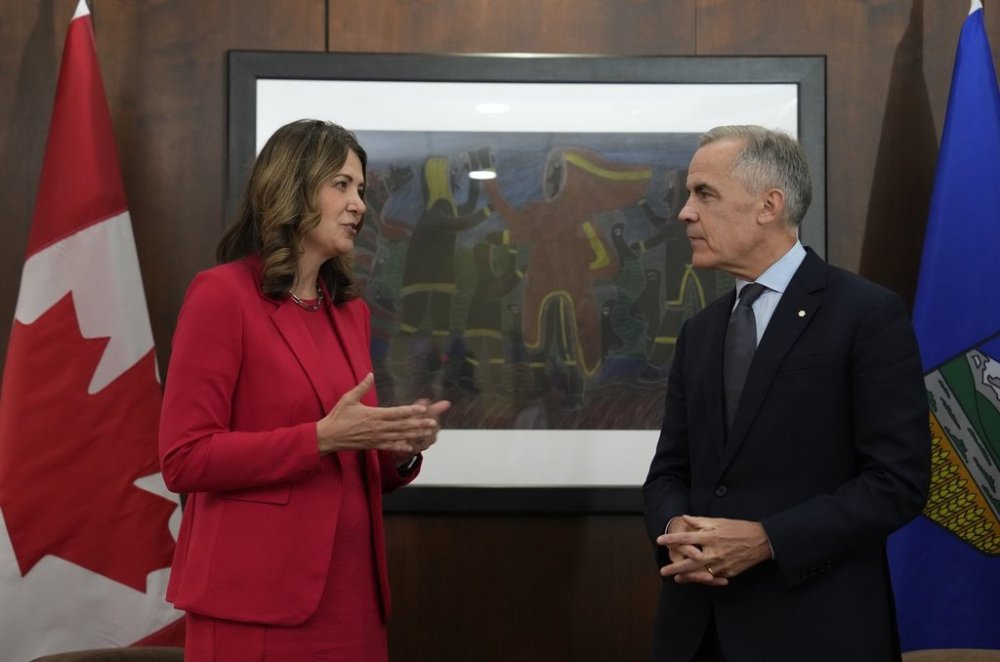Entertainment
Carney and Smith Forge Agreement on Controversial Pipeline Project

Prime Minister Mark Carney and Alberta Premier Danielle Smith have signed a memorandum of understanding that aims to facilitate the construction of an oil pipeline to the West Coast of Canada. The agreement, finalized during a ceremony in Calgary, marks a significant step towards potentially changing the current tanker ban in British Columbia (B.C.) if the project is deemed a national interest under the Building Canada Act.
This memorandum outlines a commitment from the federal government to reassess the West Coast tanker ban contingent on the approval of the pipeline project. In a notable provision, it emphasizes the importance of including Indigenous communities in the project, aiming for co-ownership and shared economic benefits. The agreement seeks to create a pathway for collaboration between the federal and provincial governments while addressing economic interests in B.C.
In conjunction with the pipeline initiative, Alberta has pledged to implement an industrial carbon price of $130 per tonne by April 1, exceeding the federal benchmark. Furthermore, the federal government will suspend clean electricity regulations in Alberta while a new carbon price agreement is negotiated. This move aligns with the broader goals of reducing carbon emissions and promoting sustainable development.
Linking Pipeline Project to Carbon Capture Efforts
The memorandum also connects the pipeline project with the proposed Pathways Alliance carbon capture initiative. Government officials have indicated that both projects must progress together to achieve their environmental and economic objectives. This dual approach aims to ensure that Alberta can meet its energy needs while also addressing climate change concerns.
The announcement comes in the wake of statements from various First Nations in B.C., asserting that a pipeline to the Pacific coast will face significant opposition. David Eby, the Premier of British Columbia, has also expressed concerns that lifting the tanker ban could jeopardize existing projects and disrupt the consensus among coastal First Nations.
Engaging with British Columbia
The memorandum highlights a commitment from both Ottawa and Alberta to engage with the B.C. government regarding the development of the pipeline. The agreement states that they will work collaboratively to advance economic interests through other nationally significant projects. This approach aims to foster a cooperative environment among the provinces, despite differing views on the pipeline’s implications.
As discussions progress, the focus will shift to how these initiatives can balance economic development with environmental stewardship and Indigenous rights. The outcome of this agreement could have lasting implications for energy policy and regional cooperation in Canada, particularly in light of the ongoing debate surrounding fossil fuel projects and climate commitments.
-

 Politics3 weeks ago
Politics3 weeks agoSecwepemc First Nation Seeks Aboriginal Title Over Kamloops Area
-

 World4 months ago
World4 months agoScientists Unearth Ancient Antarctic Ice to Unlock Climate Secrets
-

 Entertainment5 months ago
Entertainment5 months agoTrump and McCormick to Announce $70 Billion Energy Investments
-

 Lifestyle4 months ago
Lifestyle4 months agoTransLink Launches Food Truck Program to Boost Revenue in Vancouver
-

 Science5 months ago
Science5 months agoFour Astronauts Return to Earth After International Space Station Mission
-

 Technology3 months ago
Technology3 months agoApple Notes Enhances Functionality with Markdown Support in macOS 26
-

 Top Stories2 months ago
Top Stories2 months agoUrgent Update: Fatal Crash on Highway 99 Claims Life of Pitt Meadows Man
-

 Lifestyle2 months ago
Lifestyle2 months agoManitoba’s Burger Champion Shines Again Amid Dining Innovations
-

 Politics4 months ago
Politics4 months agoUkrainian Tennis Star Elina Svitolina Faces Death Threats Online
-

 Sports5 months ago
Sports5 months agoSearch Underway for Missing Hunter Amid Hokkaido Bear Emergency
-

 Politics4 months ago
Politics4 months agoCarney Engages First Nations Leaders at Development Law Summit
-

 Technology5 months ago
Technology5 months agoFrosthaven Launches Early Access on July 31, 2025





















